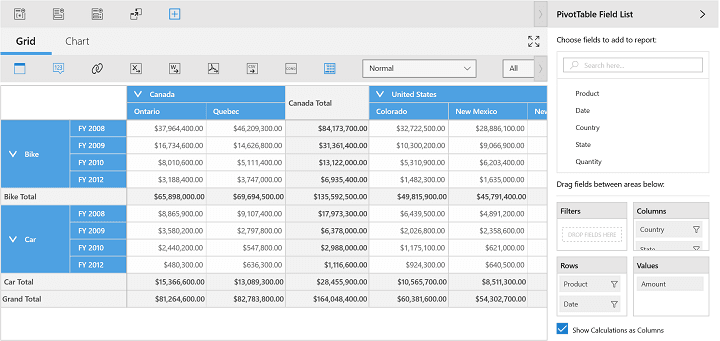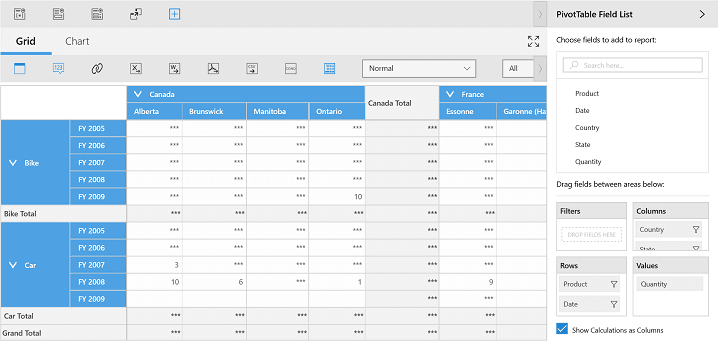Summary Types in UWP Pivot Client (SfPivotClient)
13 Mar 20254 minutes to read
The SfPivotClient supports summarizing the data for various data types by using the SummaryType property. This property should be defined while defining the pivot calculation by using the PivotComputationInfo class to specify the summary type. It holds the following summary types:
- DoubleTotalSum: Computes the sum of double or integer from pivot values for the corresponding pivot item.
- DoubleAverage: Computes the average of double or integer from pivot values for the corresponding pivot item.
- DoubleMaximum: Computes the maximum of double or integer from pivot values for the corresponding pivot item.
- DoubleMinimum: Computes the minimum of double or integer from pivot values for the corresponding pivot item.
- DoubleStandardDeviation: Computes the standard deviation of double or integer from pivot values for the corresponding pivot item.
- DoubleVariance: Computes the variance of double or integer from pivot values for the corresponding pivot item.
- Count: Computes the count of double or integer from pivot values for the corresponding pivot item.
- DecimalTotalSum: Computes the sum of decimal from pivot values for the corresponding pivot item.
- IntTotalSum: Computes the sum of integer from pivot values for the corresponding pivot item.
- Custom: Specifies that you are using a custom SummaryBase object to define the calculation.
- DisplayIfDiscreteValuesEqual: Displays the aggregated value in the pivot computation column if all the values are common.
The following code snippet shows how to set the summary type of the pivot calculation.
<syncfusion:SfPivotClient Name="PivotClient1" ItemSource="{Binding ProductSalesData}"
PivotRows="{Binding PivotRows}" PivotColumns="{Binding PivotColumns}">
<syncfusion:SfPivotClient.PivotCalculations>
<syncfusion:PivotComputationInfo CalculationName="Total" FieldName="Amount" Format="C" SummaryType="DoubleTotalSum" />
</syncfusion:SfPivotClient.PivotCalculations>
</syncfusion:SfPivotClient>PivotClient1.PivotCalculations.Add(new PivotComputationInfo { FieldName = "Amount", Format = "C", SummaryType = SummaryType.DoubleTotalSum });PivotClient1.PivotCalculations.Add(New PivotComputationInfo() With { _
Key .FieldName = "Amount", _
Key .Format = "C", _
Key .SummaryType = SummaryType.DoubleTotalSum _
})
DisplayIfDiscreteValuesEqual SummaryType
DisplayIfDiscreteValuesEqual is a new summary type that displays the aggregated value in the pivot calculation column if all the values are common, else the default value will be displayed as ‘*‘.
You can also change the default value to any custom string of your choice by using the PadString property as specified in the following code snippet.
<syncfusion:SfPivotClient Name="PivotClient1" ItemSource="{Binding ProductSalesData}"
PivotRows="{Binding PivotRows}" PivotColumns="{Binding PivotColumns}">
<syncfusion:SfPivotClient.PivotCalculations>
<syncfusion:PivotComputationInfo CalculationName="Total" FieldName="Quantity" Format="#.##" SummaryType="DisplayIfDiscreteValuesEqual" PadString="***"/>
</syncfusion:SfPivotClient.PivotCalculations>
</syncfusion:SfPivotClient>PivotClient1.PivotCalculations.Add(new PivotComputationInfo
{
FieldName = "Quantity",
Format = "#.##",
SummaryType = SummaryType.DisplayIfDiscreteValuesEqual,
PadString ="***"
});PivotClient1.PivotCalculations.Add(New PivotComputationInfo() With { _
Key .FieldName = "Quantity", _
Key .Format = "#.##", _
Key .SummaryType = SummaryType.DisplayIfDiscreteValuesEqual, _
Key .PadString = "***" _
})